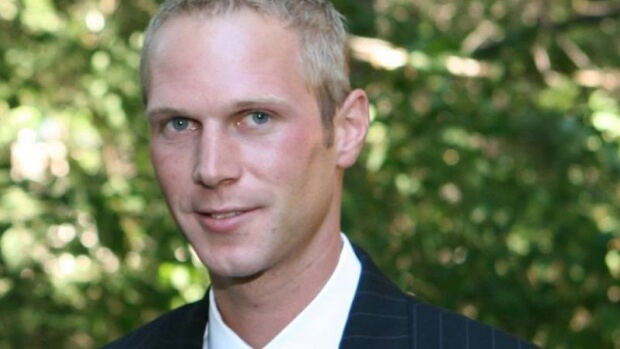It has been more than three years since Tim Bosma left his home—taken by strangers who’d come to test drive the pickup truck he was selling online—and was killed. Over a truck. Sharlene Bosma has realized she has now been without him longer than she was married to him.
Since the trial began in February, the thirty-six-year-old widow has sat in the front row of courtroom 600 at the John Sopinka Courthouse in Hamilton for the first-degree murder trial of Tim’s accused killers, Dellen Millard, thirty, and Mark Smich, twenty-eight. The Bosmas are grateful for the community support: Dozens of friends and church community members (“The Bosma Army,” they have dubbed themselves) fill the rows behind Sharlene and their families, including Tim’s parents, Hank and Mary.
Over sixteen weeks of evidence, close to 100 witnesses have been called to the stand. In the lawyers’ closing arguments this week, both accused are placing the blame squarely on each other. They admit they went on the test drive to “scope out” a truck to steal. But both insist a gun, and murder, had not been part of the plan.
Millard says it was “desperate” Smich who killed Bosma.
Smich says it was “lunatic” Millard who pulled the trigger.
Since Tim’s death, Sharlene has launched a charity, Tim’s Tribute, to help other families of victims of homicide navigate the expensive and daunting court system.
And in the meantime, she continues to file into the courtroom every day, as she has vowed to since day one, to support Tim. To look his alleged killers in the eye, as they did her the night they took him.
Monday, May 6, 2013. It was 10 p.m., and Sharlene Bosma was getting worried. Tim, her husband of three years, said he’d be right back, and right back had come and gone. They were just going for a quick spin, he’d said after tucking in their two-year-old daughter. Sharlene looked out the window and up their long gravel drive to the rural Ancaster, Ontario, road. Nothing. Darkness.
Tim had posted his truck for sale online the week before, with ads on Autotrader and Kijiji. Earlier that day, a guy had called Tim’s cell, confirming he was coming by to check it out that night. The prospective buyer and a friend were coming all the way from Toronto, Tim told Sharlene.
His pickup—a black 2007 Dodge Ram 3500—was handsome. With a powerful Cummins diesel engine, it was perfect for a rural guy like Tim, who ran his own heating, ventilation and air-conditioning business. But the young dad was thinking of building another house, and he planned to put the cash he made from the truck toward a new plot of land. He was going to buy his friend’s old truck, a Ford F150; he just needed to sell the Ram. He was looking into a mortgage, too. That was Tim, says his father, Hank. Always working toward something.
After a service at Ancaster Christian Reformed Church the day before, Tim, Sharlene, and their daughter had spent the afternoon at Westfield Heritage Village with his family. The outing was an early 60th birthday celebration for Tim’s mother, Mary, and Tim’s three sisters were there with their families. Mary was beaming, watching her whole brood together.
So Monday was a typical day. Around 9 p.m., the two potential buyers came by the house and Tim—still in jeans and work boots—smiled at Sharlene and told her he’d be right back. The guys, one of them tall and broad in a bright orange shirt and the other stockier with a red hoodie pulled up over his head, also smiled at Sharlene before climbing into the truck. They rolled out of the driveway.
Now, it was 10:30 p.m. This wasn’t like Tim. Something wasn’t right. She called the police.
The next morning, Hamilton Police put out a release saying that Tim Bosma, thirty-two, had gone missing. The Mountain Division had started its investigation as soon as Sharlene called 911. But the release made no mention of the two men, or that Tim had left on a test drive. At first read, some wondered if he’d just taken off. Trouble in paradise, depression, debts—who knew. On top of that, the family wasn’t speaking to the media. Theories and rumours flew. Meanwhile, family and friends, many from their church community, had sprung into action, combing nearby fields and ditches looking for any sign of Tim.
An hour away in Acton, Peter Lowe woke up early that morning to send off a work proposal. Then, logging onto Facebook, he saw Tim’s photo splashed across his homepage with the word “MISSING.” He didn’t recognize Tim at first, but then remembered him from high school. Tim was a friend of a friend, Pete Lise.
“Like everyone else, “ says Lowe, “I thought, Okay, probably problems with his wife, skipped town . . . I asked a friend what’s going on. She said, you know, test drive . . . truck . . . hasn’t been back since . . . And I thought something’s going on here.”
By the end of the day, with Tim missing almost twenty-four hours, the Bosmas’ garage had become the command post for an army of volunteers. A map of the area was spread out, and roads were highlighted one by one as they were checked. When police, fearing they could disturb evidence, told them to stop looking, they shifted gears, creating flyers with photos of Tim’s face and truck.
Bumper stickers and posters were drawn up. Thousands would be tucked under windshields and slapped on storefronts across Hamilton and beyond. Others took to social media, and a Facebook page and Twitter hashtag were created.
Wednesday morning, Hamilton Police held a news conference. Because of the unusual nature of the disappearance, the homicide unit was taking over the case. It was still a missing person case, Det. Matt Kavanagh stressed, but this allowed them to pour more resources into it. Finally, details of the test drive were confirmed.
Kavanagh stressed it was the truck, not Tim, being targeted. That made sense. The big motor—one of the world’s best diesel engines—is worth more than $20,000 new. Kavanagh warned others advertising similar pickups online to be wary and on the lookout for two men inquiring about a test drive.
Lowe watched the news conference from home and wanted to help. Soon after, he pulled into the Bosmas’ driveway, amazed at the organized chaos. Dozens more volunteers were filing in and out. Stacks of Tim Hortons and gas station gift cards were delivered. Lasagnas and casseroles. Coffees.
He spotted his friend Pete Lise in the garage, who tasked him with putting up posters in a neighbourhood in Toronto. The guys had said they were from Toronto, after all. But when Lowe mentioned that he had been working in social media, his friend paused. “Hang on a sec,” Lise told him, racing into the house.
The volunteers needed Lowe’s expertise. Within hours, he was the family’s default spokesperson, managing the Facebook page, which had more than 3,400 subscribers, and answering the phone.
Lowe gently suggested it might be a good idea for the family to speak to the public. He could see that their silence wasn’t necessarily being interpreted well. Sharlene’s voice would help keep Tim’s face on the front page.
By Thursday, Sharlene was ready to hold her news conference. With both her mother and Tim’s standing solemnly behind her, Sharlene addressed the cameras, her voice shaky but fierce: “My name is Sharlene Bosma and Tim is my husband. He is my partner, and my best friend. He is the love of my life, and the father of my child. The last few days have been very difficult for myself and our families. This does not feel like real life. This only happens on TV and in movies. It does not happen in real life.
“My husband, Tim, is a loving father to our beautiful 2-year-old girl. And she needs her daddy back. His parents need their little boy back, and all of our brothers and sisters need their brother back. We look forward to putting our arms around Tim again, and telling him how much we love him. We hope and we pray that today is the last day of this nightmare.
“Tim is blond and has wonderful blue eyes. When he gives a big smile—which he does frequently—he has dimples in his cheeks. He has a dimple in his chin, the same dimple that our daughter has. He loves to tell jokes and if you ask his nieces and nephews they will tell you what a huge pest Uncle Timmy is.
“One of the kids the other day said that Uncle Timmy has been stolen, and I can not describe it better than that. Tim has been stolen from us. Tim’s world revolves around our daughter, and I know that she is number one in his mind right now.
“I ask and I beg and I plead to whomever has my husband, to please let him go. It was just a truck. It is just a truck. You don’t need him. But I do. And our daughter needs her daddy back. So please, please let him come home. We need him to come home. And may God have mercy on you.”
Late that night, police caught a break. Tim’s cellphone was recovered in an industrial area in West Brantford. And Tim’s truck had been seen in downtown Brantford around 10:10 p.m. the night Tim went missing.
By Friday, more than 150 officers were on the case. There were ground and aerial searches and mounted and K9 units, as well as resources from the Ontario Provincial Police and Brantford police.
On Twitter, Tim’s name was widely circulated, with Help Find Tim posts retweeted by people like Jann Arden and Rick Mercer. Tips were pouring in, and police had to set up a special line. Media from across the province were on the story now.
In another news conference, Kavanagh revealed that through Tim’s cellphone, police were able to track down the number that had called him for the test drive. That phone was purchased under a bogus name and had been active only three months. Cell tower information linked it to different areas of Etobicoke, in west Toronto. But shortly after Tim went missing, that phone, like Tim’s, was turned off.
Through a warrant of that phone’s records, it was determined the same two men had test-driven a red Dodge Ram 2500 pickup in Etobicoke one day before Tim went missing. The seller provided a description of them that matched Sharlene’s. He said the taller one had a tattoo on his wrist: “AMBITION.”
On Friday, May 10, a man named Dellen Millard was questioned. Millard, then twenty-seven, ran a Waterloo Region-based aviation business, Millardair, founded by his grandfather. Police wanted to know whether he’d heard about the missing Tim Bosma. They also wanted to know about the tattoo on his wrist. But eventually they thanked him and left.
Two hours later, Millard was driving in Mississauga when his blue GMC Yukon was rear-ended at a red light. He was boxed in, surrounded by more than a dozen officers with protective vests, their guns pointed at him. Millard was arrested and charged with forcible confinement and theft of the Ram pickup. Police now had a suspect, but no truck and no Tim.
Sunday, May 12, was Mother’s Day, and Mary Bosma’s son was still missing. Media lingered at the end of the Bosmas’ driveway, waiting for a development. Inside the house, Peter Lowe gently suggested a Mother’s Day plea might be a good way to keep Tim’s name at the top of the news. The family was reluctant; Mary was a private, quiet woman. But she agreed, and at noon she stood confidently in the family garage and read a statement.
“It has been a very rough week for all of us,” she said, her voice wavering. “We don’t know where he is. We don’t know if he’s safe, or who’s got him . . . We know even though there’s been an arrest, he still is not home with us. My heart is broken. I love him so much. We just want him home and on this Mother’s Day, it is my prayer and my wish to get my son home, with us, safe, to his wife and daughter and to his family. Thank you.”
That same morning, a cluster of neighbours in Kleinberg, just north of Toronto, grew suspicious about a large trailer parked in a driveway. Large enough to hold a truck, it had sat at Madeleine Burns’s home since Thursday night. As the name Dellen Millard continued to make headlines, neighbours on the quiet cul-de-sac made a shocking realization: that was Millard’s mother’s house. In late afternoon, the trailer—registered to Millardair—was hauled off by Hamilton Police for forensic investigation.
Police extended their search to a farm property owned by Millard in North Dumfries, Ontario, in the Region of Waterloo. Several cruisers and a forensics van were parked on the lot, where a laneway leading to a barn was cordoned off with yellow police tape. An army-style tent had been set up. By now, the story was so big that media outlets were paying to get aerial footage of the farm search. Planes captured photos of a yellow Volkswagen Beetle parked on the lot that belonged to one of the country’s lead forensic anthropologists, Tracy Rogers. Officers in full forensic suits sifted through soil and covered the field, looking for clues.
Meanwhile, after a week of trying days and sleepless nights, the Bosmas sent their search party home for a break. The family was desperate for some normalcy. A handful of their closest friends—Peter Lowe now among them—stuck around with Sharlene, piling onto couches to watch Tim’s favourite movie, Dumb and Dumber. That might seem strange now, but in the frightening chaos of that week, it was an immense comfort. Tim would have wanted them to try to laugh.
Lowe distinctly remembers the laughter that night. Even he, who on arrival barely knew Tim, had hit his breaking point emotionally, to the point where he asked to speak with his pastor, who came right to the Bosma house. “I thought, ‘Okay God, if he’s dead or alive these people need to know.’ ”
Detective Matt Kavanagh came to the house on the morning of Tuesday, May 14, dressed in a suit. Kavanagh, standing by the fireplace, told everyone that Tim was dead. Murdered. Through their cries of agony, he told them the body was burned beyond recognition, Tim’s remains having been discovered at Dellen Millard’s farm. The response was a mix of sounds Lowe says he didn’t even know a human could make.
Two days later, Sharlene spoke at the church, to thank the media, the public and the police for their help:
People tell me I have been so strong, and all I know is I have a beautiful two-year-old girl at home who now needs her mommy more than ever. And (she) needs her mommy to hold it together, so I know that I cannot fall apart. But I am broken, because part of me is gone.
This will never really be over for us. As a family, with our friends, and our community, we will remember Tim. And his daughter will grow up knowing how much he loved her. She will know how much he was loved. By me and his family, his friends, and even perfect strangers, Tim will always be loved. And he will always be remembered . . . I love you, Tim.
One week later, the family held a public memorial for Tim at Carmen’s—the same hall where he and Sharlene were married three years earlier. More than 1,800 people, many of them strangers, filled the hall. Sharlene addressed those who were skeptical that Tim was an innocent victim: “It’s difficult to accept. Tim was just a guy, a regular, average guy, doing a regular thing.” But on May 6, she said, “the devil led the vilest form of evil down my driveway and it smiled at me before taking Tim away.”
As Tim’s life was celebrated with tears and laughter, police were arresting another man: Mark Smich, a twenty-five-year-old from Oakville and a friend of Millard, though seemingly nothing like him. He had a minor criminal record and an amateur rap career and lived at his mother’s house. The media cast him as Dellen’s alleged sidekick, the right hand man of a wealthy aviation heir.
Sharlene has made scrapbooks for when her daughter gets older. Photos of Tim and his little girl. Selfies they took in the camper with their tongues touching their noses, photos of them playing on the slide, or opening gifts Christmas morning.
She asked friends to email stories of Tim to save for her daughter. On Father’s Day 2014, Sharlene arranged a get-together of Tim’s friends in the garage, where they sat around a camera to share recollections of their lost buddy. It was heart-wrenching to sit through, but she is glad she did it.
It took several months before she could watch videos of her and Tim together. But finally, she says, “I just got to the point where I missed the sound of him too much.” Now, the whole family could hear Tim’s laugh again. In one video, Tim is playing with their daughter as she pushes a toy lawn mower around the house. Every few steps, he pretends she’s run over his toe, jumping up and down, yelling “Ow! Ow! Ow!” as the baby girl cackles away. Sharlene sits so close to the TV her neck is craned, tears falling as she laughs along with her family, going back in time.
Slowly but surely, life has gone on. But Sharlene still finds it hard going out, even for groceries. She is often recognized, and strangers still approach her. Hank and Mary find that, too. Worse still, acquaintances recognize them and scuttle off to avoid interacting. “They don’t know what to say to you, so they won’t say anything,” says Mary. “I realize it’s awkward for people, so we try to make everybody comfortable, try talking about different things.”
Hank finds it’s the worst at work in the afternoons, where Tim’s smiling face is displayed in his cubicle. In traffic, on the commute home from Toronto, he’ll break down. Banging his fist on the dashboard of his car. Asking why.
“I want to cry all the time,” he says. “My stomach has never been right since he disappeared. Still in a knot. I feel weepy, I can cry just like that.”
But they’re trying. They read books on grief. They’ve grown closer to Sharlene, spending extra time with their granddaughter, his spitting image. They go out with friends.
In January 2014, Mary’s father died. He never got over Tim’s death. Each day, they say, he got a little worse. “When he passed away, Mary and I went to see him,” Hank says. “We saw the body and it hit us both hard. We never had a body with Tim. We didn’t get to say goodbye, it was just a little box.”
They credit their faith more than anything for getting them through. “It’s a challenge in the way that, of course, we’re angry,” Mary says. “God did not do this, but he didn’t stop it. That is something that we always think of. But we could not have gotten through this without God . . . We don’t know why this happened, but without our faith I don’t think we’d be getting up every morning. We try to continue our life as best as we can.
“And that’s what Tim would’ve wanted. You can’t just sit at home and cry every day. It doesn’t do any good.”
Adapted excerpt from The Vilest Form of Evil: Tim Bosma’s Murder One Year Later by Molly Hayes. ©2014 Toronto Star Newspapers Limited.




